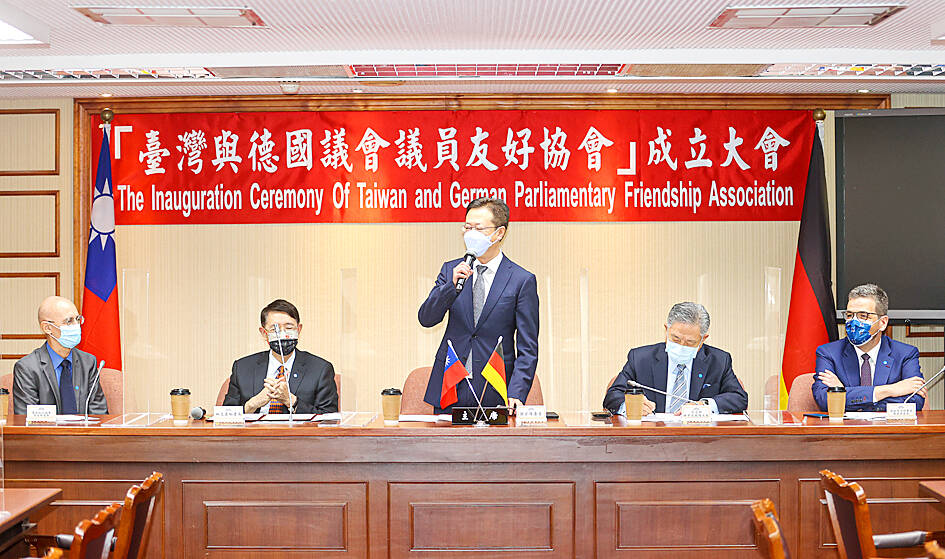Pan-green camp legislators yesterday inaugurated the Taiwan-German Parliamentary Friendship Association at the Legislative Yuan in Taipei, as officials from the two countries seek to boost their ties through bilateral trade, cooperation and exchanges.
German Institute Taipei Director-General Jorg Polster and Ministry of Foreign Affairs officials also participated in the event.
Democratic Progressive Party (DPP) Legislator Chang Hung-lu (張宏陸) is to serve as chairman of the association, comprising 41 lawmakers across party lines. Independent Legislator Freddy Lim (林昶佐), New Power Party Legislator Chiu Hsien-chih (邱顯智), and DPP legislators Fan Yun (范雲) and Lin Yi-chin (林宜瑾) are to serve as Chang’s deputies.

Photo: CNA
German Trade Office Taipei Executive Director Axel Limberg lauded the timing of the launch, as it came ahead of a German parliament delegation visit to Taiwan next month.
Limberg said trade and cooperation between the two countries have developed positively in the past few years, warranting the foundation of a parliamentary friendship association.
German officials have in the past few months spoken up for Taiwan at the WHO, the International Civil Aviation Organization and other UN organizations, he said.
The ties between the two countries are expected to grow closer over the coming years, Limberg added.
Polster said the two countries have a long history of cooperation and exchanges, and last year had a bilateral trade volume of US$20 billion.
Germany is Taiwan’s largest trading partner in Europe, and Taiwan is Germany’s fifth-largest trading partner in Asia, he said.
Chang said he has had a positive impression of German culture ever since helping organize a German Oktoberfest in New Taipei City.
Deputy Minister of Foreign Affairs Tien Chung-kwang (田中光) said Taiwan is a major trade partner of Germany, and the two sides have since 2016 signed more than 10 bilateral agreements.

Taiwan is stepping up plans to create self-sufficient supply chains for combat drones and increase foreign orders from the US to counter China’s numerical superiority, a defense official said on Saturday. Commenting on condition of anonymity, the official said the nation’s armed forces are in agreement with US Admiral Samuel Paparo’s assessment that Taiwan’s military must be prepared to turn the nation’s waters into a “hellscape” for the Chinese People’s Liberation Army (PLA). Paparo, the commander of the US Indo-Pacific Command, reiterated the concept during a Congressional hearing in Washington on Wednesday. He first coined the term in a security conference last

Prosecutors today declined to say who was questioned regarding alleged forgery on petitions to recall Democratic Progressive Party (DPP) legislators, after Chinese-language media earlier reported that members of the Chinese Nationalist Party (KMT) Youth League were brought in for questioning. The Ministry of Justice Investigation Bureau confirmed that two people had been questioned, but did not disclose any further information about the ongoing investigation. KMT Youth League members Lee Hsiao-liang (李孝亮) and Liu Szu-yin (劉思吟) — who are leading the effort to recall DPP caucus chief executive Rosalia Wu (吳思瑤) and Legislator Wu Pei-yi (吳沛憶) — both posted on Facebook saying: “I

The Ministry of Economic Affairs has fined Taobao NT$1.2 million (US$36,912) for advertisements that exceed its approved business scope, requiring the Chinese e-commerce platform to make corrections in the first half of this year or its license may be revoked. Lawmakers have called for stricter enforcement of Chinese e-commerce platforms and measures to prevent China from laundering its goods through Taiwan in response to US President Donald Trump’s heavy tariffs on China. The Legislative Yuan’s Finance Committee met today to discuss policies to prevent China from dumping goods in Taiwan, inviting government agencies to report. Democratic Progressive Party Legislator Kuo Kuo-wen (郭國文) said

The Ministry of Economic Affairs has fined Taobao NT$1.2 million (US$36,900) for advertisements that exceeded its approved business scope and ordered the Chinese e-commerce platform to make corrections in the first half of this year or its license would be revoked. Lawmakers have called for stricter supervision of Chinese e-commerce platforms and more stringent measures to prevent China from laundering its goods through Taiwan as US President Donald Trump’s administration cracks down on origin laundering. The legislature’s Finance Committee yesterday met to discuss policies to prevent China from dumping goods in Taiwan, inviting government agencies to report on the matter. Democratic Progressive Party